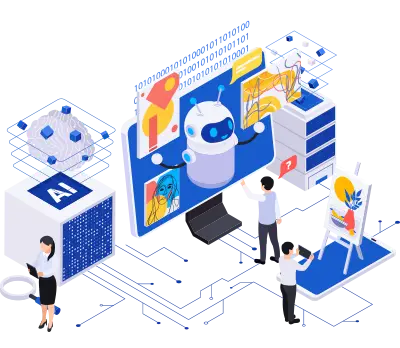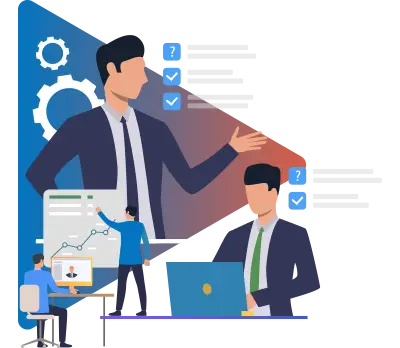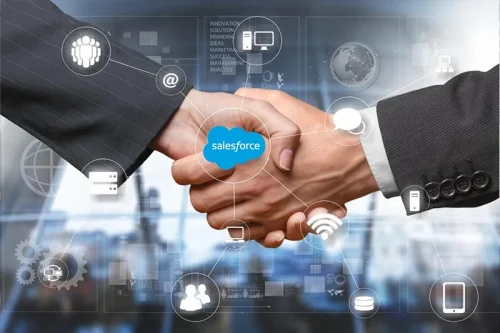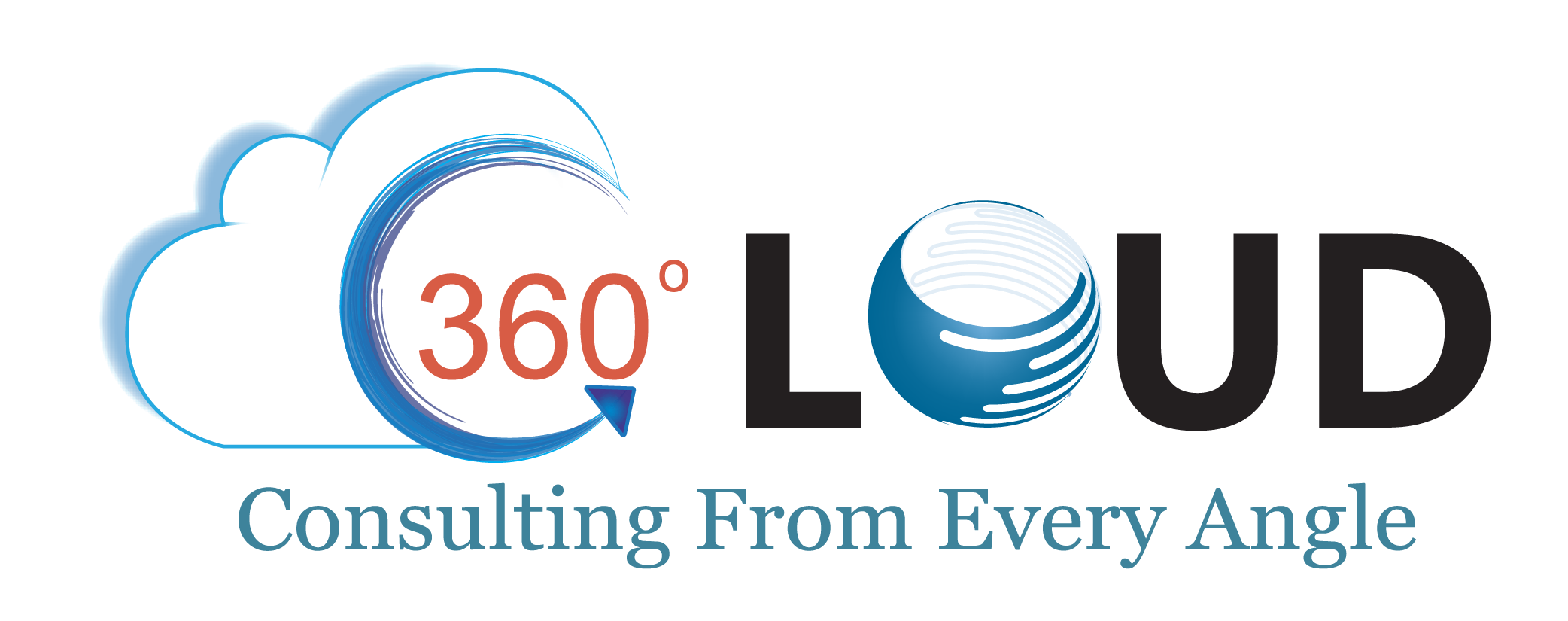Agentic Enterprise: Salesforce’s Vision for AI at Work in 2026
19 Nov 2025
Table of Contents

This year has definitely become a pivoting point for business transformations. We have now gone ahead of task automation and reached the stage of intelligent, autonomous systems. This is the core of AI transformation, demanding a fundamental redesign of how work gets done. But why the sudden, widespread shift? Because traditional automation can’t handle complexity or decision-making. Companies are now moving toward agentic workflow automation because they offer true scale and proactive intelligence. Leading this monumental movement is Salesforce, who has defined the architectural model for this new reality as the Agentic Enterprise.
The vision is more than just product features; it’s the realization that AI must be grounded in trusted, unified customer data and built to collaborate directly with people. With the launch of the Agentforce 360 platform, Salesforce is providing the blueprint for how companies can seamlessly connect humans, intelligent agents, and data in one trusted ecosystem, making the Agentic Enterprise the default operating model for growth and customer success in the modern era.
Table of Contents
What Is an Agentic Enterprise?
When we say Agentic Enterprise, we simply think of a business that uses AI for their operations, but it is actually way more than that. It’s a fundamental and strategic shift by businesses in how they get their work done.
AI agents are becoming highly popular as they have the capability to reason, adapt, and act by themselves. AI agents are better than automation as they can make decisions by evaluating the data and take relevant action to get the needed outcome. Considering the agentic enterprise model, AI is the key partner in it. The goal of this model is to streamline operations and boost efficiency, enabling employees to focus on more important and complex tasks.
The Shift from Prompt to Autonomous Workflow
Traditional generative AI for business is prompt-based. A user types a command, and the AI executes that task. The Agentic Enterprise is more than that.
It relies on Autonomous AI Agent, which is actually a software built not just to respond to a prompt, but to pursue complex goals, break them down into multi-step actions, and perform end-to-end tasks.
Start building your autonomous, revenue-driving workforce today.

Machine-Driven Decisions with Human Oversight
A key characteristic of this model is human-AI collaboration. The AI agents are given the authority to execute tasks and make minor, high-velocity decisions (such as when to send a follow-up email or assign a lead). This is the machine-driven decision-making component.
However, humans retain control and oversight for strategy, ethics, and complex exceptions. They set the high-level goals, approve final creative materials, and monitor the agent’s performance through centralized dashboards. The human workforce shifts from performing repetitive tasks to becoming supervisors and strategists, leveraging the agentic workforce for scale and speed. This collaboration ensures that productivity soars while maintaining trust, compliance, and strategic direction.
The Real Problems Businesses Face Today
Before we move ahead to read what Agentic Enterprise has to promise business, let’s think of the current reality of the working sector. Despite so many digital transformation efforts, many firms still struggle with inefficiencies and less productivity. Here are some of the real-world challenges that you might relate to.
1. Repetitive Manual Work is Slowing Teams Down
The concept of automation isn’t always as effective as we expect. There are times when automation only picks easy tasks, leaving out the complex and tedious ones. The result is the same; sales reps are stuck with admin tasks. This not only leads to the waste of time, but also cause lost revenue and poor customer experience.
2. Fragmented Data Across Systems
It has become quite common for firms to rely on multiple applications to manage their work, but sometimes intead of helping, it just ends up in data sprawl. As a result, they fail to achieve a unified single source of truth that can be followed by the team members. Due to this, whenever a sales rep tries to access customer data, chances are he won’t be able to access accurate and update information. This would lead to delays in decision making and would also affect customer experience.
3. Too Many Tools, Not Enough Unified Automation
Tools used these days are just a stack of specialized apps that don’t actually speak the same language. Teams have to constantly work through switching screens, sometimes working on CRM, ERP, email, or Slack, which consumes a lot of time. These isolated systems never provide teams with a unified layer of automation, causing bottlenecks to take proactive actions.
4. Teams Want AI, But Can’t Implement It Safely
It has become a universal need for firms to work with AI but actually implementing it can be a daunting task. Most organizations don’t have internal skills to safely implement and customize AI models. Also, they lack an understanding of security and governance that can affect sensitive customer data.
Salesforce’s Vision: The Era of the Agentic Enterprise
Salesforce is not just participating in the AI race; it is defining the track. The company’s vision for the Agentic Enterprise is rooted in the belief that AI must be integrated directly into the flow of work, fueled by trusted data, and governed by enterprise-grade security. This strategic approach ensures that AI is not a separate project, but the operating system of the entire company.
What Salesforce Means by “AI Agents”
For Salesforce, an AI Agent (powered by the Agentforce 360 platform) is far more capable than a simple chatbot or script. These agents are intelligent, proactive entities designed for the CRM ecosystem. They are distinct because they have three core capabilities:
- Reasoning: AI agents have the ability to analyze huge volumes of data (structured or unstructured) with the help of Salesforce Einstein 1 platform.
- Memory: These agents have a record of all previous decisions and interactions through which they learn and take relevant decisions.
- Action: These agents have the capability to take over autonomous tasks across different sections like sales or marketing, executing accurate end-to-end processes.
Want to see Agentforce in action?

Unified Data Powering End-to-End Automation
Unified data is the foundation of the Agentic Enterprise model. The unique advantage of Salesforce lies in Data Cloud, which helps to unify data from every source, whether it is in Salesforce or out of it.
Unifying all the customer data is necessary for organizations as it helps to ensure that every AI-powered decision is grounded, accurate, and in accordance with the customer information. When an AI agent is assigned a task, it analyzes data from this unified pool of information and takes necessary actions to run end-to-end automation.
AI-Driven Decisions with Einstein 1
The intelligence layer in Agentic Enterprise is provided by Salesforce Einstein 1 Platform. It is embedded with different AI models supported by Salesforce, which helps in taking AI-driven decisions. Instead of using traditional and generic logic, Einstein 1 works on the grounds of generative AI for business and decides how the goal can be achieved on the basis of past successes, real-time data, and probability.
How Salesforce AI Agents Actually Work
The power of the Agentic Enterprise lies in its ability to transform complex business goals into executed outcomes, moving from static data logs to dynamic, autonomous action. Salesforce achieves this through the Agentforce platform, which acts as the operating system for this new digital workforce.
Autonomous Task Execution and Multi-step Workflows
Unlike simple automation that stops after one action, Agentforce-powered AI agents are designed for Autonomous Task Execution. This means you assign them a high-level objective, and they determine the necessary sequence of steps, reasoning through dependencies and executing them without human input.
This capability is essential for Multi-step Workflows that span multiple systems and departments. For example, a single goal like “Onboard a new high-priority customer” can trigger an agent to handle the entire chain:
- Conversation Handling: Respond to the initial inquiry in Slack or Service Cloud.
- Case Creation & Data Update: Automatically create the onboarding case and update all relevant customer records in the CRM.
- Scheduling: Find a suitable time with the customer and schedule the implementation manager.
- Approvals: Initiate an internal approval process for discounted professional services.
- Follow-Ups: Schedule and send personalized follow-up emails, dynamically adjusting the tone based on the customer’s response history.
Agentforce: The Enterprise Agent Platform
Agentforce, the dedicated AI Agent Platform by Salesforce, is the power behind intelligent collaboration. Here are all the tools it provides to enable agents to work on scale.
- Agent Builder: It is a low code tool that helps developers and admins to create agents and grant them permissions to work on needed processes across different Salesforce clouds.
- Skills Library: This catalog consists of pre-built process flows and actions for agents to work with.
- Guardrails and Safe Execution: This is Salesforce’s trust layer. It involves security and governance rules, which are embedded directly into the agent’s logic. This helps to ensure agents don’t take any unapproved actions in violation of data privacy policies.
- Monitoring and Optimization: Agentforce provides a central Command Center, so leaders can observe the performance and efficiency of every deployed agent.
Get the blueprint for transforming it into proactive AI actions.

The Central Role of Salesforce Data Cloud
No AI agent can act intelligently on fragmented, inconsistent data. This is why integration with Salesforce Data Cloud is non-negotiable for the Agentic Enterprise.
Data Cloud ingests, cleans, and unifies all customer data—from website clicks to transactional history—into a single, trusted source. The AI agents rely on this foundation:
- The agent reads data (e.g., discovering a customer hasn’t bought a specific product yet).
- It makes suggestions (e.g., recommending a personalized upsell campaign).
- It updates records (e.g., logging the interaction and changing the lead score).
This continuous cycle of reading, reasoning, and writing ensures that every autonomous action an agent takes is accurate, relevant, and directly aligned with the company’s single source of customer truth.
How to Prepare Your Business for an Agentic Enterprise Model
The Agentic Enterprise isn’t something you install overnight; it’s a future state you architect toward. Simply follow these five actionable steps to prepare your organization for the autonomous world and move towards becoming an Agentic Enterprise.
Step 1: Fix Data Quality First
AI agents are only efficient when they are working on a solid foundation of clean data. If your data is incomplete or fragmented, it will end up in agents making poor decisions.
When you plan on deploying AI workflow automation, make sure to work on data cleansing and unification, ensuring you have a single source of accurate data. Work with Data Cloud to unify all your customer data, so all autonomous processes will be grounded on accurate data.
Step 2: Identify Repetitive, High-Volume Tasks
Many users make the mistake of automating all processes at once. Make a small start and automate such processes that help you save more time. Consider going for repetitive and time-consuming sales or service tasks.
Automating simple and predictable tasks like case routing or lead qualification process can immediately free up your most valuable human assets for strategic work.
Step 3: Implement Guardrails Before Deployment
Trust is paramount when you are considering working with autonomous AI. This is why it is highly necessary to establish guardrails. These are the security and governance rules that define what an agent can and cannot do.
Define strict permissions for your AI agents. What data can they read? What approvals must they obtain? Salesforce’s Agentforce platform provides these built-in governance features to ensure agents operate within your compliance boundaries, making safe execution a non-negotiable part of the process.
Step 4: Upskill Teams for AI Adoption
When you work with an Agentic Enterprise model, your role shifts from task performer to strategist. Your employees need new skills to manage, monitor, and optimize agents rather than just interacting with the CRM.
Launch internal training programs focused on “agent management” and “prompt engineering goals.” You should encourage team members to learn to trust their new digital partners to achieve successful AI adoption.
Step 5: Partner with a Certified Salesforce Consultant
When moving to an Agentic Enterprise model, you need to focus on making complex decisions related to security, data structure, and process re-engineering. That’s where having a certified expert can help.
Consider bringing a certified Salesforce consultant onboard who specializes in Agentforce and Data Cloud. They have the relevant knowledge and experience to accelerate your roadmap, ensure your architecture is scalable, reducing risk and maximizing your time-to-value.
Agentic Enterprise: Your Future Operating Model
Becoming an Agentic Enterprise shouldn’t be seen as just an upgrade, but a strategic move that can help a company grow in a competitive ecosystem, where customer experiences should be the prime focus. It’s time to move away from fragmented, manual processes towards a unified and intelligent system.
Salesforce’s vision, powered by Agentforce 360 and grounded in Data Cloud, offers the only roadmap that connects this autonomous intelligence directly to your most valuable assets: your customer data and your CRM. By adopting this model, you don’t replace your people; you empower them to focus on strategy, relationships, and innovation, while the agents handle high-volume, cross-functional execution.
The time to prepare is now. The early movers who commit to cleaning their data, implementing smart governance, and training their teams will secure a massive competitive advantage. Don’t let your business be defined by the old era of task automation. Embrace the future where every interaction is intelligent, every decision is informed, and every employee is amplified.
Want to know Agentforce capabilities that orchestrate complex tasks?

FAQs
What is an Agentic Enterprise?
An Agentic Enterprise is a new organizational model where human employees and intelligent, autonomous AI agents work together seamlessly. Instead of just relying on rigid automation, the AI agents are goal-driven: they can reason, make decisions, take multi-step actions, and proactively manage workflows across the entire business.
How is Salesforce using AI agents?
Salesforce is using AI agents (via the Agentforce platform) to transform core CRM tasks across Sales, Service, Marketing, and Commerce. The agents are designed to handle end-to-end workflows—like full lead qualification, automated case resolution, or personalized outreach sequencing—without needing continuous human input for every step.
How are AI agents different from chatbots or copilots?
Chatbots and copilots are typically prompt-based and reactive (they wait for human input). AI agents are autonomous and proactive. A Copilot writes an email when you tell it to. On the other hand an AI Agent detects a high-value lead, reasons that outreach is needed, drafts the email, gets approval, and sends it—all autonomously to achieve a goal.
Is Agentic Enterprise safe for sensitive business data?
Yes. Salesforce emphasizes trust and governance. The Agentforce platform includes built-in guardrails and security features to ensure agents only access data they are permitted to see (using the unified Data Cloud) and that their actions comply with business rules, preventing hallucinations and misuse.
Do I need clean data before using AI agents?
Absolutely. Clean, unified data is the single most critical foundation. AI agents rely on accurate data to reason and make decisions. If your data is fragmented or messy, the agents will make poor, untrustworthy choices. Salesforce uses Data Cloud to ensure agents are grounded in a single, reliable source of truth.
About the author
Kriti SharmaKriti, Assistant Manager - Content at 360 Degree Cloud, brings over 8 years of experience as a content strategist and writer, specializing in the Salesforce ecosystem. She is an expert at crafting compelling narratives, translating complex topics around Salesforce, automation, and AI into high-impact content that resonates with the audience and drives measurable marketing results. Outside of her professional life, Kriti fuels her creativity by exploring new places and seeking out fresh perspectives.
Recent Blogs
 Salesforce Services
Salesforce Services
Top Salesforce Consulting Partners in India You Can Count On
The global CRM market size was valued to be around USD 112.91 billion in 2025 and is expected to grow from USD 126.17 billion in 2026 to…
Read More Salesforce Services
Salesforce Services
Salesforce Partners: What They Are, Partner Tiers & Why You Need One
Implementing Salesforce for business operations can often be described as buying a high-performance jet; no wonder it’s an incredible piece of machinery, but it won’t get you off the ground without a…
Read More Hire Staff
Hire Staff
Hire a Salesforce Developer: 7 Reasons Your Business Needs One
Whenever a company starts getting Salesforce projects, and work starts to pile up, the first option that comes to their mind is to look for…
Read MoreReady to Make the Most Out of Your Salesforce Instance?
Our Salesforce aces would be happy to help you. Just drop us a line at contact@360degreecloud.com, and we’ll take it from there!
Subscribe to our newsletter
Stay ahead with expert insights, industry trends, and exclusive resources—delivered straight to your inbox.



